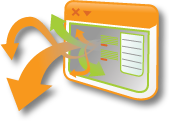In the last post, I mentioned that our objects are listening to us. Much of this is done in the name of providing a better experience – if an object can adjust to the way in which you interact with it, it should be able to anticipate some of your future requirements or actions. In doing so, these objects gather quite a bit of data about us.
Objects are gathering data about us
I mentioned that my car stores my basic usage preferences (seat location, radio favorites, etc.). This is useful within the context of the car, but the data is kept within the scope of that system. The value of this data would be increased if it were portable. Wouldn’t it be nice if your preferences followed you from vehicle to vehicle? A couple of things need to happen for that to work. First, the car needs to cede ownership of your preferences to you. Second, the industry would need to standardize on a way to represent and transfer your preferences. Once that’s done, you could introduce the data into another system. You would then be able to combine that data with other data to find other interesting patterns.
Objects are generating data about us
I did some work for a payments processor a while ago. I was struck, not only by the insane amount of data that was captured every time you spend electronic money, but my the ultra-insane amount of analysis and inference that their systems performed on your data. Not only does the analysis help with fraud prevention, but it allows them to make real-time decisions about whether to allow you to surpass your credit limits or whether they should extend your limit. They knew, with a high degree of precision, when and where you did your spending, as well as how much you spent on what.
Again, this data is out of your control. It is gathered, stored, and maintained by the credit card companies. But, how much information could you ascertain about yourself given access to their data and analysis?
Someday, our objects will talk about us
I think the real value will be realized once our objects can share data about us. Once your computer, which records virtually every action you take in its presence, can talk to your preferences while using other objects, your spending and travel habits, and other sensors in your environment, it will be able to identify patterns not readily visible to casual observation.

